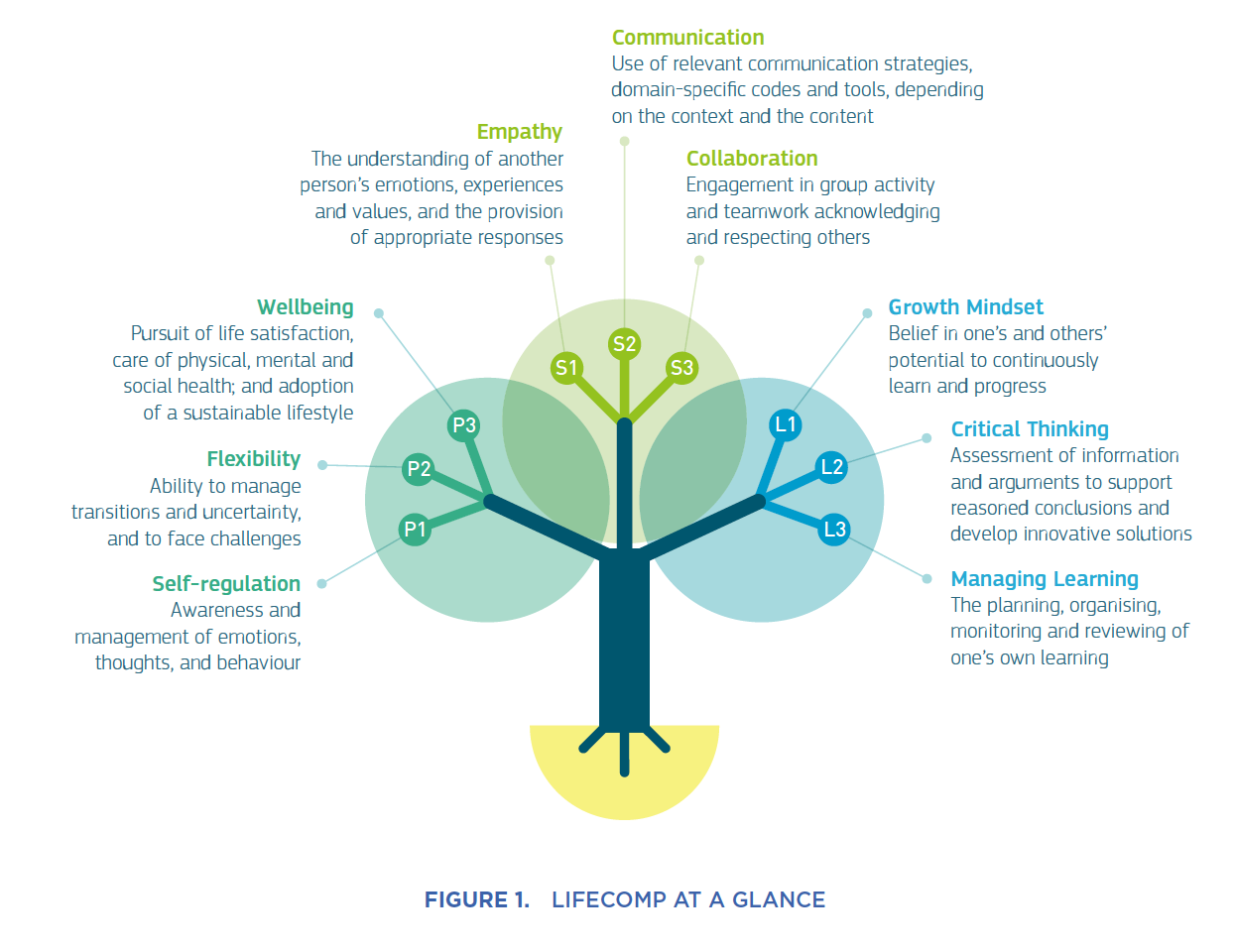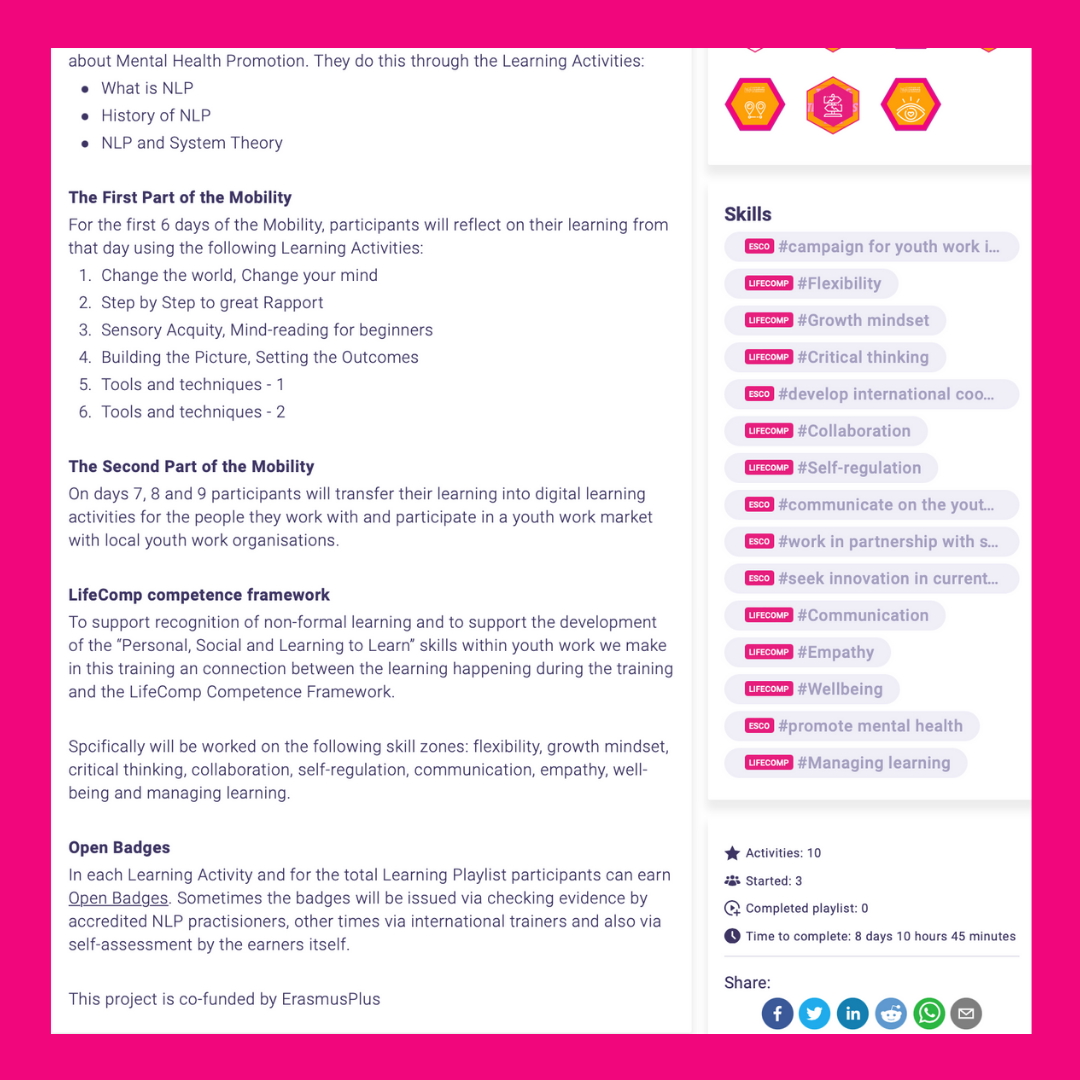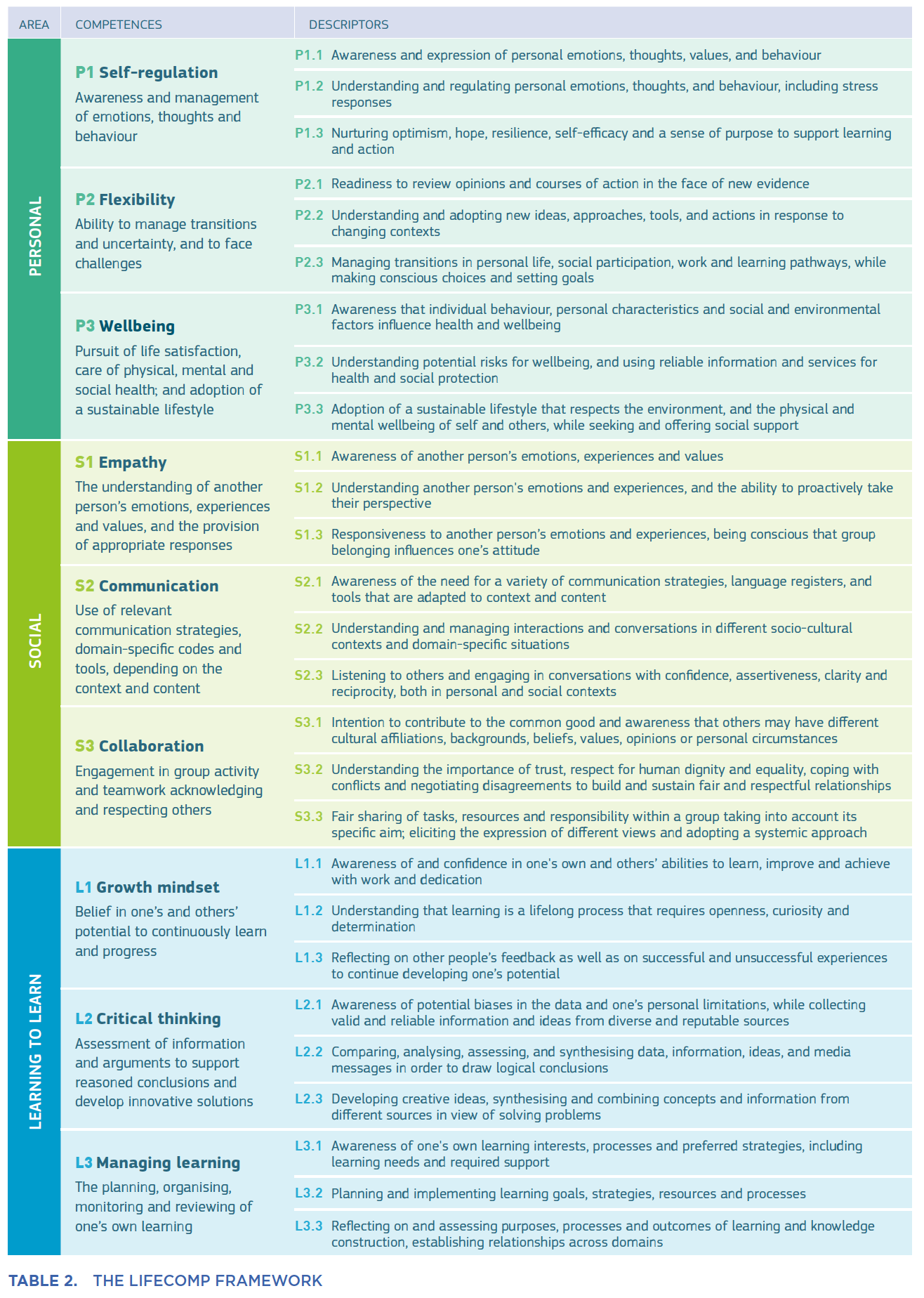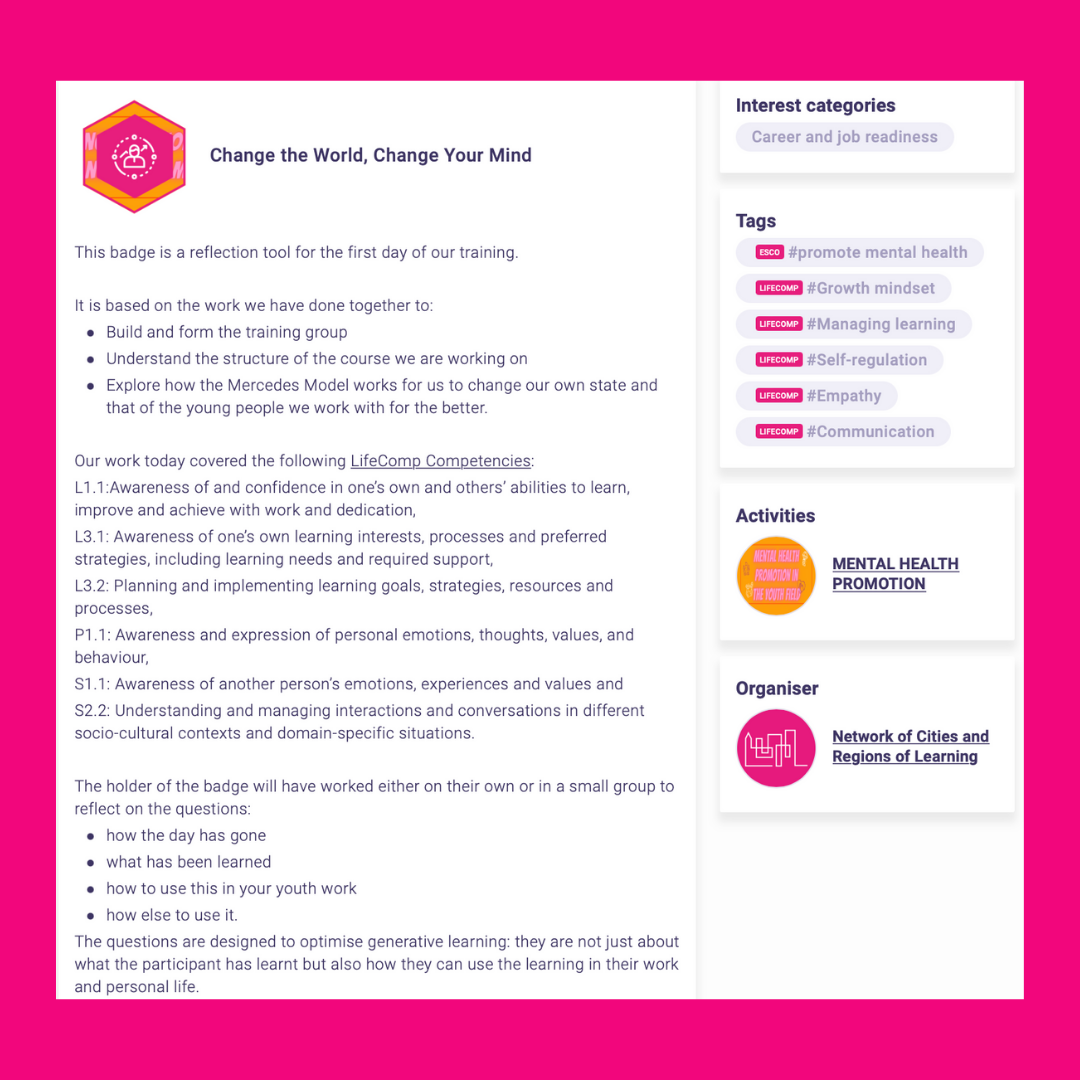18
MENTAL HEALTH PROMOTION
MENTAL HEALTH PROMOTION
Content
This Learning Playlist is part of the international training course Mental Health Promotion in the Youth Field. There are 3 parts to this training.
Before the Mobility
Participants of this international training course are requested to prepare by doing some research into the NLP that we will use as a model for our learning about Mental Health Promotion. They do this through the Learning Activities:
- What is NLP
- History of NLP
- NLP and System Theory
The First Part of the Mobility
For the first 6 days of the Mobility, participants will experience youth work activities and reflect on their learning from that day using the following Learning Activities:
- Change the world, Change your mind
- Step by Step to great Rapport
- Sensory Acquity, Mind-reading for beginners
- Building the Picture, Setting the Outcomes
- Tools and techniques - 1
- Tools and techniques - 2
The Second Part of the Mobility
Participants will transfer their learning into (digital) learning activities for the people they work with and participate in a youth work market with local youth work organisations.
LifeComp competence framework
To support recognition of non-formal learning and to support the development of the “Personal, Social and Learning to Learn” skills within youth work we make in this training an connection between the learning happening during the training and the LifeComp Competence Framework.
Spcifically will be worked on the following skill zones: flexibility, growth mindset, critical thinking, collaboration, self-regulation, communication, empathy, well-being and managing learning.
Open Badges
In each Learning Activity and for the total Learning Playlist participants can earn Open Badges. Sometimes the badges will be issued via checking evidence by accredited NLP practisioners, other times via international trainers and also via self-assessment by the earners itself.
This project is co-funded by ErasmusPlus
Dejavnosti za dokončanje
Opravite naslednje aktivnosti, prislužite si značke in videli boste posodobitev napredka na seznamu predvajanja
Content
Are you an educator in the field of youth or in adult education and working mostly in non-formal settings? Are you using the Cities of Learning Platform to improve the sustainability of non-formal learning opportunities? Do you want to support your learners in recognising their learning in a way that it is useful for their personal life and career path? Then perhaps this Learning Activity is interesting for you.
What is LifeComp competence framework
JRC Science For Policy Report describes the following “The LifeComp framework is a flexible tool that can be adapted to different learning settings, and target groups to support the development of the “Personal, Social and Learning to Learn” competences in context. Its ambition is to provide an agreed upon conceptual framework for the “Personal, Social and Learning to Learn” key competence for lifelong learning. Educational stakeholders could consider LifeComp as a basis for discussion, and for promoting this key competence.
LifeComp consists of 3 areas, Personal Learning, Social Learning and Learning to Learn. Every area has 3 competences:
Personal learning
- Self-regulation,
- Flexibility and
- Wellbeing
Social learning
- Empathy,
- Communication and
- Collaboration
Learning to Learning
- Growth mindset,
- Critical Thinking and
- Managing Learning

The LifeComp framework results from a robust research methodology, where a large and diverse group of experts were consulted at different stages for feedback, and to progressively reach a consensus around a validated proposal. Nevertheless, the framework is not yet fully been adapted to, or tested in practice. A subsequent step will be to try the LifeComp framework out in practice by implementing and evaluating it in a specific context. Feedback from practitioners and end-users is expected to continuously help with amending and refining the framework, both by virtue of the transversal nature of this input, and of these contributors’ existing educational experiences (e.g. socio-emotional education)."
Why use LifeComp competence framework
An important reason for introducing the concept of competences in our youth field jargon is to indicate precisely the abilities that transcend within a specific practical situation and that can be used widely in different sectors.
In non-formal learning people are aware of the importance of the learning that is happening for the individual. For years educators are supporting reflection of what has been learned and how to use this learning elsewhere. What if we include recognised competence frameworks in our non-formal education? Would we then extend the recognition of the learning by the learner itself to also recognition by formal education and the business field? And would this create better well being and a career perspective? Or a better recognition of learning happening in the non-formal youth field? We don’t know yet, but it is worth checking it out, isn’t it?
Reasons why organisers of Cities of Learning are using LifeComp in their learning activities:
- In our rapidly changing society people need to update their skills, knowledge and behaviour constantly to stay updated and to be ready for what a person needs on personal and career pathways.
- To support learners in what they learn in a non-formal learning setting, LifeComp can be a solution to use vocabulary that is recognised by non-formal, formal and informal stakeholders
- To offer competency based non-formal experiences and training
- To attract learners who want to learn specific skills
- To support acquisitors when they search for people with specific skills
How to integrate the LifeComp Framework in your Learning Activity on the Cities of Learning Platform
- Define first who your target group is to whom you want to write about your learning activity and make the activity attractive for that learner.
- Define if it is important for the learner to know more about LifeCom. Or the competences that the learner is working on at activity level?
- When you choose to describe competences at activity level then it is best to describe that a learner can work on a specific skill, behaviour or knowledge in that specific context. Most of the time learners are not gaining complete competence in a short-non formal learning activity. Though working on a competence can be very valuable.
For example within this Learning Activity some competences of the the LifeComp framework has been shortly described:

In the case of LifeComp you can describe if the learning has happened on the level of awareness, understanding and action. Because all the 9 competences (Self-regulation, Flexibility, Wellbeing, Empathy, Communication, Collaboration, Growth mindset, Critical thinking and Managing learning) have a descriptor structure: awareness (1), understanding (2) and action (3).

More information about each area, competence and descriptor you can find in the resources added to this activity. Per descriptor you will find an explanation.
Within non-formal education it is very important that a learner can self-assess what needs or wants to be learned or has been learned. We as educators can go beyond self-assessment by describing or assessing the behaviour that we have seen, and which knowledge and any associated beliefs are behind it within an activity.
How to integrate the LifeComp Framework in the Open Badge on the Cities of Learning Platform
Open Badge is a digital standard to recognise various achievements, like participation, membership, personal qualities and exceptional skills, or the completion of a learning journey. Each badge is a micro-credential certificate and data about badge issuer and earner, a description of the badge and criteria for earning it. And perhaps links to evidence how the badge has been earned, information about competence framework or endorsers.
Third parties, like employers or employment agencies are looking at validity, reliability and flexibility of what a person has learned, worked on, or achieved is via checking how assessment has been done, who was the issuer of a badge, how much hours has been worked on a specific skill, or if there is another party who endorsed what has been learned.
Here it could be beneficial to add more content about specific competences in the badge description

You can earn a badge for implementing LifeComp in a Learning Activity The badge will be issued based on self-assesment.
Gradivo
- LifeComp: The personal area
- P1 Self-regulation
- P1.1 Awareness and expression of personal emotions, thoughts, values, and behaviour
- P1.2 Understanding and regulating personal emotions, thoughts, and behaviour, including stress response
- P1.3 Nurturing optimism, hope, resilience, self-efficacy, and a sense of purpose to support learning and action
- P2 Flexibility
- P2.1 Readiness to review opinions and courses of action in the face of new evidence
- P2.2 Understanding and adopting new ideas, approaches, tools, and actions in response to changing contexts
- P2.3 Managing transitions in personal life, social participation, work and learning pathways, while making conscious choices and setting goalspng
- P3 Wellbeing
- P3.1 Awareness that individual behaviour, personal characteristics and social and environmental factors influence health and wellbeing
- P3.2 Understanding potential risks for wellbeing, and using reliable information and services for health and social protection
- P3.3 Adoption of a sustainable lifestyle that respects the environment, and the physical and mental wellbeing of self and others, while seeking and offering social support
- LifeComp: The Social Area
- LifeComp: S1 Empathy
- S1.1 Awareness of another person’s emotions, experiences and values
- S1.2 Understanding another person’s emotions and experiences, and the ability to proactively take their perspective
- S1.3 Responsiveness to another person’s emotions and experiences, being conscious that group belonging influences one’s attitude
- LifeComp: S2 Communication
- S2.1 Awareness of the need for a variety of communication strategies, language registers, and tools that are adapted to context and content
- S2.2 Understanding and managing interactions and conversations in different socio-cultural contexts and domain-specific situations
- S2.3 Listening to others and engaging in conversations with confidence, assertiveness, clarity and reciprocity, both in personal and social contexts
- LifeComp: S3 Collaboration
- S3.1 Intention to contribute to the common good and awareness that others may have different cultural affiliations, backgrounds, beliefs, values, opinions or personal circumstances
- S3.2 Understanding the importance of trust, respect for human dignity and equality, coping with conflicts and negotiating disagreements to build and sustain fair and respectful relationships
- S3.3 Fair sharing of tasks, resources and responsibility within a group taking into account its specific aim; eliciting the expression of different views and adopting a systemic approach
- LifeComp: The Learning Area
- LifeComp: L1 Growth Mindset
- L1.1 Awareness of and confidence in one’s own and others’ abilities to learn, improve and achieve with work and dedication
- L1.2 Understanding that learning is a lifelong process that requires openness, curiosity and determination
- L1.3 Reflecting on other people’s feedback as well as on successful and unsuccessful experiences to continue developing one’s potential
- LifeComp: L2 Critical Thinking
- L2.1 Awareness of potential biases in the data and one’s personal limitations, while collecting valid and reliable information and ideas from diverse and reputable sources
- L2.2 Comparing, analysing, assessing, and synthesising data, information, ideas, and media messages in order to draw logical conclusions
- L2.3 Developing creative ideas, synthesising and combining concepts and information from different sources in view of solving problems
- LifeComp: L3 Managing Learning
- L3.1 Awareness of one’s own learning interests, processes and preferred strategies, including learning needs and required support
- L3.2 Planning and implementing learning goals, strategies, resources and processes
- L3.3 Reflecting on and assessing purposes, processes and outcomes of learning and knowledge construction, establishing relationships across domains
Pridobite značko aktivnosti
LIFECOMP IN CITIES OF LEARNING Pridobi to značko
The owner of this badge has investigated the LifeComp Competence Framework, with the aim to find ways to integrate the framework in their educational activities on the Cities of Learning Platform.
JRC Science For Policy Report describes the following “The LifeComp framework is a flexible tool that can be adapted to different learning settings, and target groups to support the development of the “Personal, Social and Learning to Learn” competences in context. Its ambition is to provide an agreed upon conceptual framework for the “Personal, Social and Learning to Learn” key competence for lifelong learning. Educational stakeholders could consider LifeComp as a basis for discussion, and for promoting this key competence.

Naloge
Naloga št.1
Dokaze preveril: samopotrditev
Share proof where you have integrated LifeComp competence framework in your educational activity.
Veščine
#Mental Health Promotion
ESCO
#campaign for youth work in the local community
LIFECOMP
#Flexibility
LIFECOMP
#Growth mindset
LIFECOMP
#Critical thinking
ESCO
#razvijati strategije mednarodnega sodelovanja
ESCO
#masirati
LIFECOMP
#Collaboration
LIFECOMP
#Self-regulation
ESCO
#komunicirati o dobrobiti mladih
ESCO
#talk with the selected community
ESCO
#sodelovati v partnerstvu z uporabniki socialnovarstvenih storitev
ESCO
#relaxation methods
ESCO
#iskati inovacije za tekoče prakse
ESCO
#check story
LIFECOMP
#Communication
LIFECOMP
#Empathy
LIFECOMP
#Wellbeing
ESCO
#spodbujati duševno zdravje
LIFECOMP
#Managing learning
Aktivnosti: 17
Začeto: 56
Dokončan seznam predvajanja: 12
Potreben čas za dokončanje: 16 dan 9 ura 15 minuta
Deli:
Organizatorji
Cities of Learning Network
Badge issuer recognized with
Preklopite na drug jezik:

